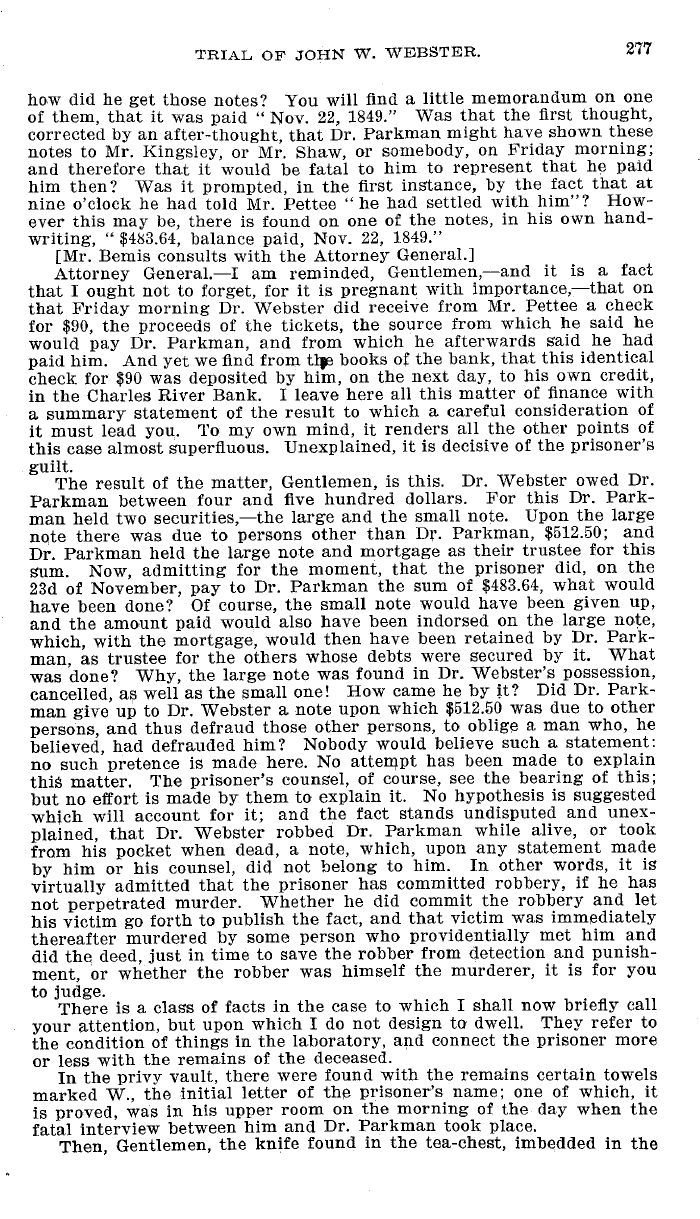|
TRIM, OF JOHN W. WEBSTER. 277
how did he get those notes? You will find a little memorandum on one
of them, that it was paid " Nov. 22, 1849." Was that the first thought,
corrected by an after-thought, that Dr. Parkman might have shown these
notes to Mr. Kingsley, or Mr. Shaw, or somebody, on Friday morning
and therefore that it would be fatal to him to represent that he paid
him then? Was it prompted, in the first instance, by the fact that at
nine o'clock he had told Mr. Pettee " he had settled with him"? How-
ever this may be, there is found on one of the notes, in his own hand-
writing, " $483.64, balance paid, Nov. 22, 1849."
[Mr. Bemis consults with the Attorney General.]
Attorney General.-I am reminded, Gentlemen,-and it is a fact
that I ought not to forget, for it is pregnant with importance,-that on
that Friday morning Dr. Webster did receive from Mr. Pettee a check
for $90, the proceeds of the tickets, the source from which he said he
would pay Dr. Parkman, and from which he afterwards said he had
paid him. And yet we find from t* books of the bank, that this identical
check for $90 was deposited by him, on the next day, to his own credit,
in the Charles River Bank. I leave here all this matter of finance with
a summary statement of the result to which a careful consideration of
it must lead you. To my own mind, it renders all the other points of
this case almost superfluous. Unexplained, it is decisive of the prisoner's
guilt.
The result of the matter, Gentlemen, is this. Dr. Webster owed Dr.
Parkman between four and five hundred dollars. For this Dr. Park-
man held two securities, the large and the small note. Upon the large
note there was due to persons other than Dr. Parkman, $512.50; and
Dr. Parkman held the large note and mortgage as their trustee for this
sum. Now, admitting for the moment, that the prisoner did, on the
23d of November, pay to Dr. Parkman the sum of $483.64, what would
have been done? Of course, the small note would have been given up,
and the amount paid would also have been indorsed on the large note,
which, with the mortgage, would then have been retained by Dr. Park-
man, as trustee for the others whose debts were secured by it. What
was done? Why, the large note was found in Dr. Webster's possession,
cancelled, as well as the small one! How came he by it? Did Dr. Park-
man give up to Dr. Webster a note upon which $512.50 was due to other
persons, and thus defraud those other persons, to oblige a man who, he
believed, had defrauded him? Nobody would believe such a statement:
no such pretence is made here. No attempt has been made to explain
this matter. The prisoner's counsel, of course, see the bearing of this;
but no effort is made by them to explain it. No hypothesis is suggested
which will account for it; and the fact stands undisputed and unex-
plained, that Dr. Webster robbed Dr. Par kman while alive, or took
from his pocket when dead, a note, which, upon any statement made
by him or his counsel, did not belong to him. In other words, it is
virtually admitted that the prisoner has committed robbery, if he has
not perpetrated murder. Whether he did commit the robbery and let
his victim go forth to publish the fact, and that victim was immediately
thereafter murdered by some person who providentially met him and
did the deed, just in time to save the robber from detection and punish-
ment, or whether the robber was himself the murderer, it is for you
to judge.
There is a class of facts in the case to which I shall now briefly call
your attention, but upon which I do not design to dwell. They refer to
the condition of things in the laboratory, and connect the prisoner more
or less with the remains of the deceased.
In the privy vault, there were found with the remains certain towels
marked W., the initial letter of the prisoner's name; one of which, it
is proved, was in his upper room on the morning of the day when the
fatal interview between him and Dr. Parkman took place.
Then, Gentlemen, the knife found in the tea-chest, imbedded in the
|

